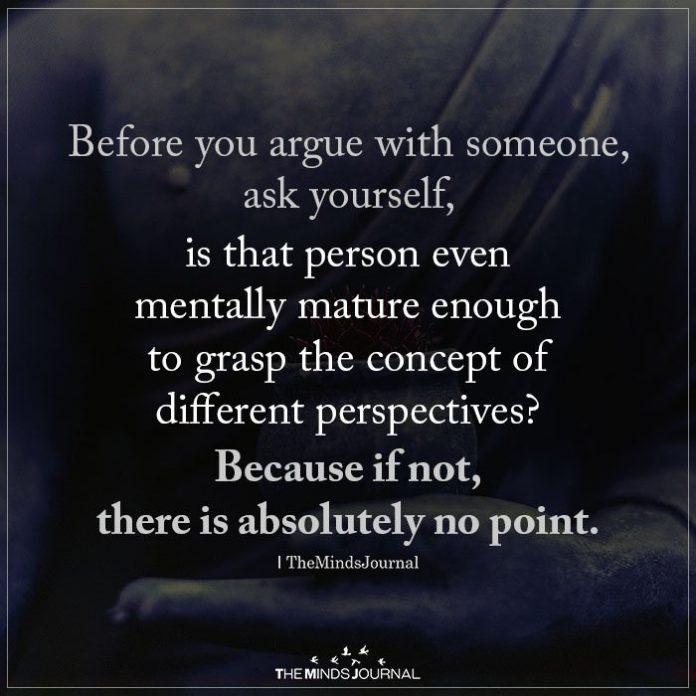Arguing with someone who doesn’t want to listen to your opinions and what you have to say, is nothing short of exasperating.
It’s important to set someone straight, right? You need to be clear about your position and debate with someone else to prove your point, right? You can’t let someone get away with a wrong opinion without informing them they are wrong, right?
Unfortunately, it’s not right. When someone believes what they believe and resists new information, every attempt to set them straight really just cements their position and their belief that they can’t let a new idea take hold. If you think about a fight, when one person pushes another or hits them – the person either pushes back or recoils in horror. It doesn’t encourage someone to move toward you, or toward your position.
And you expend energy being upset. Being frustrated. Feeling helpless or defeated because you just can’t make someone who has an opposing view see that they are wrong. You might have facts, data, and information to the contrary to prove your point, but hard as you try, the person you are arguing with just digs their heels in deeper and stands firmer in their position.
In sales there is a term called “qualifying” – it means you don’t waste your time on someone who is likely never to buy from you. You qualify to figure out where someone is in the process and whether they will ever be open to listen to your offering or to consider making a purchase. When determining if someone is worth your time to disagree with, or share an opinion, or provide a differing point of view, be sure to qualify.
This means being careful about where you share your insights and pearls of wisdom. It means taking care of yourself – not to find yourself in constant conflict with those around you who just don’t want to listen to reason. Arguing with someone who doesn’t want to listen and isn’t “qualified” to the point where they can be open or curious about a new viewpoint only puts you and that person further at odds.

When you give out your energy to someone who is locked down in their thinking and hasn’t shown you that they might be open, you are sending energy out without receiving anything in return. In fact, thinking back to the fight analogy, you are sending energy that is either hitting a brick wall or being utilized by someone else to be used back against you. This does nothing but depletes you. It is truly a waste of your time and focus. The point of “qualifying” your listener is to be sure you are sending energy where it will multiply and be more positive.
Taking this approach does not mean you never have a point of view! It doesn’t mean you don’t provide information to someone who is willing to listen. It means you are thoughtful and careful about the energy you spend and how you spend it. If you are passionate about something, you want to share information and explain why it matters to you so much – just be selective about where and when you do it.
Sometimes the best approach to changing someone’s mind is not to hit them head-on with your ideas, but to drip on them with something to consider, to read, to ponder in their free time. Sometimes it is best to send them an “I was thinking of you when I read this” and provide insight or a link to an article or video that could provide them information.
Being careful about who receives what you have to offer is a way of taking care of yourself. It actually enhances your energy and provides you the encouragement to find those that do care and want to listen and learn.
Related: 5 Good Reasons To Stop Arguing With A Narcissist
Consider this the next time you want to blast someone on social media, or write a nasty retort to someone with a different point of view, or argue with someone that you know doesn’t care and won’t care no matter how much you do care.
Resolve to “qualify” your audience and what you will say to whom.
Conserve your energy for what matters in your life. Continue to drip and inform where you can be heard, and ignore those that pull from you. This makes for a much more productive and peaceful life.
Check out Beverly Flaxington’s best selling book on Amazon.
Written By Beverly Flaxington
Originally Appeared In Psychology Today
When you argue with someone who doesn’t want to listen to what you have to say, and is hell-bent on sticking to their views and opinions, then it’s useless wasting your time and energy trying to make them understand your point of view. People who you think have a chance of considering your opinions, deal with them tactfully. But people who are narrow-minded and rigid, it’s better to pull away from them.










Leave a Reply